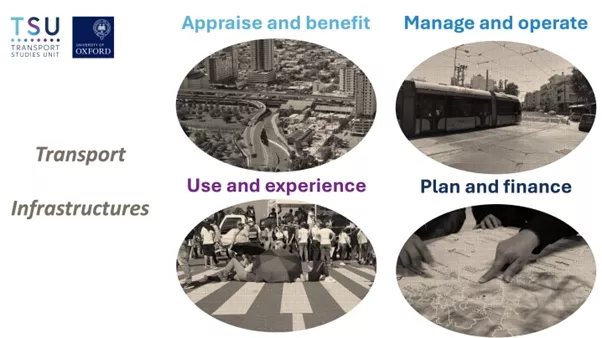Global Challenges in Transport: Infrastructures
Overview
The Global Challenges in Transport – Infrastructures online course gives transport professionals from around the world a unique opportunity to broaden their knowledge on the way transport infrastructures are planned, financed, evaluated, managed, and used.
Our insightful videos in combination with lively synchronous discussions with our lecturers make this a great opportunity to reflect critically on your own work and broaden your international network of transport professionals tackling the infrastructure challenges around the world.
Academics from the Transport Studies Unit at Oxford University will be joined by experts from different sectors and contexts in delivering this course aimed at exploring how urban mobility depends on infrastructure that is accessible, flexible, and an instrument for sustainable development. We will look beyond the hardware of trains and buses to discuss the importance of systems (BRTs, cable cars, and metros) and people to foster a lively urban environment in various global contexts.
Global Challenges in Transport: Infrastructures | Status: CLOSED |
| Course Director: Dr Juan Pablo Orjuela | |
| Course Coordinator: Ms. Helen Morrissey | |
| Dates: 1 October - 8 November | |
| Course Format: Online | |
| Course Length: 6 weeks | |
| Course Fee: Private sector £2,500; Public sector £1,500. Discounts and scholarships available. | |
| Key Dates: Last day for scholarships and general applications: Monday 16 September. | |
| Applications closed > | |
Learning Objectives
- To broaden transport professionals' understanding of how transport infrastructures can be evaluated, managed, and planned.
- To reflect critically on the way they are used and not used by different people in urban settings.
- To develop an enhanced understanding of the links between transport infrastructure and economic, social, and environmental components of sustainable development.

Four ovals highlighting the four main topics of the course: Appraise and benefit (showing a city), manage and operate (showing a tram), use and experience (showing two people in a crossing), and plan and finance (showing hands on a map).
Learning Outcomes
After attending this course, you will be able to:
- Apply to your own transport practice some of the lessons learnt from other transport infrastructure case studies from around the world.
- Utilise a variety of theoretical and methodological approaches for transport infrastructure appraisal, planning and managing.
- Understand and critically evaluate the relationships between transport infrastructure and the people who use it.
Course content and lecturers
The Infrastructures course begins with an introductory week followed by an exploration of appraisal and wider economic benefits of transport infrastructure. We will then move to the challenges of managing various types of transport systems, before moving to key discussions on the importance of infrastructure use and mobility practices. Before concluding with group work presentations, we will close the course with discussions on how to better plan for new infrastructure and how to finance both new and renewed infrastructure in various contexts.
As is now tradition in our courses we will begin with opportunities from participants to quickly share their work and expertise with colleagues through Pecha Kucha-style presentations, and will end with group presentations that combine participants own knowledge with those insights learnt throughout.
Our sessions will include lectures by:
Course Schedule
The course has an estimated time commitment of approximately 42 hours including individual study, small group work, and live sessions. Individual study includes going through pre-recorded lectures and any additional material suggested by lecturers. Participants will be divided into small groups and will be asked to present their work to their peers and TSU researchers at the end of the course.
| Week 1 | Week 2 | Week 3 | Week 4 | Week 5 | Week 6 | Total | |
|---|---|---|---|---|---|---|---|
| Individual study | 3 hours | 3 hours | 3 hours | 3 hours | 3 hours | - | 15 hours |
| Small group work | - | 1 hour 30 min | 1 hour 30 min | 1 hour 30 min | 1 hour 30 min | 30 min | 6.5 hours |
| Live sessions with all participants | 3 hours | 3 hours | 3 hours | 3 hours | 3 hours | 3 hours | 18 hours |
| Progress sessions in small groups | 30 min | 30 min | 30 min | 30 min | 30 min | - | 2.5 hours |
Combined total estimated time commitment: 42 hours over 6 weeks.
Live sessions will take place every Tuesday and Thursday at 12:30pm BST. Additional live sessions will take place on the Friday of Week 1 and Week 6, and the Course Director and Course Coordinator will meet with participants in small groups on the remaining Fridays to resolve any doubts and advise on group work progress.
| Mon | Tue | Wed | Thu | Fri |
|---|---|---|---|---|
| Week 1 - Introduction | ||||
30 Sept | 1 Oct
| 2 Oct | 3 Oct
| 4 Oct
|
| Week 2 - Appraise and benefit | ||||
7 Oct | 8 Oct
| 9 Oct | 10 Oct
| 11 Oct
|
| Week 3 - Manage and operate | ||||
14 Oct | 15 Oct
| 16 Oct | 17 Oct
| 18 Oct
|
| Week 4 - Use and experience | ||||
21 Oct | 22 Oct
| 23 Oct | 24 Oct
| 25 Oct
|
| Week 5 - Plan and finance | ||||
28 Oct | 29 Oct
| 30 Oct | 31 Oct
| 1 Nov
|
| Week 6 - Conclusions | ||||
4 Nov | 5 Nov
| 6 Nov | 7 Nov
| 8 Nov
|
Please note that the programme is indicative and may be subject to change.
Who should attend?
The Infrastructures course is designed for experienced transport professionals and researchers with a minimum of 3 years' experience in the sector and aims to bring together the world's leading experts from academia, policy and practice to address complex transport challenges. The course is intended for those who are looking to expand their knowledge horizons and gain a more in-depth and interdisciplinary understanding of the challenges and solutions in delivering sustainable transport.
We specifically invite applications from:
- Professionals in the transport and mobility consultancy sector in charge of implementing new solutions for transport infrastructures.
- Individuals with experience in transportation consulting, planning, and related government agencies.
- Academics and researchers in transportation planning, civil engineering, economics, planning, and/or urban mobility.
Scholarship Opportunities
Various discount options as well as scholarship opportunities are available. Find out more about our scholarships or contact us: exed@tsu.ox.ac.uk
Or find out more about our Global Challenges in Transport Programme and our other courses
In brief
This 6-week online course introduces a range of approaches to thinking about transport infrastructures, with particular emphasis on the interaction between transport systems and users. It proposes a variety of theoretical and methodological approaches for developing mobility alternatives able to adapt to foster sustainable development.
The course adopts a strong interdisciplinary and interactive approach including insights from social science, environmental science, and both human and physical geography. Through its live sessions, participants get real-time interaction with experts from around the world and course lecturers.
The estimated time commitment for this course is 42 hours including independent study, group work, and live sessions.

